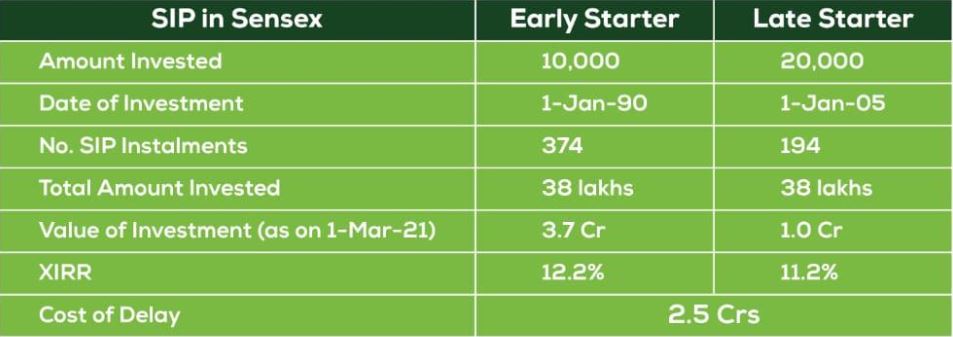In order to build a corpus, certain factors must be taken into consideration, such as lifestyle costs, risk appetite, and medical costs.
Personal Finances and “Procrastination” go hand in hand. There is a tendency to delay the process of financial planning or starting that SIP or simply heading to the bank. In case we have been thoughtful and had a head start in planning the investments, the process of tracking them and reviewing them takes a backseat due to sheer laziness. This could hinder the idea and process of building a big corpus to ensure you retire comfortably. If you find yourself backtracking on your personal finance and investments, it is high time you get out of your shell and begin disciplined investing. For those who have just got employed, start early! There are a few ways that are listed below to build your corpus.
1. Start Early
Yes. As the expression goes — “ The early bird catches the worm,” the best way to start building on your corpus to enjoy a comfortable retired life is to start it young. The moment you get your first job, then onwards, financial planning should be a part and parcel of your life. Investments in insurance, equities, mutual funds, etc., should be part of your portfolio. SIPs are a good way of ensuring this. This can be explained by way of a simple example indicated in the below image.

In the example, you will notice that an investment of Rs.10,000/-made in a SIP in January 1990 would give you a final corpus of Rs.3.7 crores with an XIRR of 12.2%. On the other hand, the same amount invested in January 2005 would give you a final corpus of Rs.1 crore with an XIRR of 11.2%. The delay in making this investment would cost the investor Rs.2.5 crores. This simple example would suffice the idea of starting your investments and financial planning young.
2. Hike your SIP annually
Simply investing Rs.10,000 every month is sufficient when you just begin your employment. However, once you have a comfortable life with savings, investments, and an increase in income, and you feel you can increase your SIP amount, then you could increase it by 10% every year. This would give you a bigger corpus than just Rs.3.5 crores! Apart from this, any bonuses received could help you reach your goal fast. One must make a note not to stop or make any abrupt changes to the SIP or investment options, based on changes in the market. If you persist through these bear phases in the market, the acquisition costs will minimize and the long-term return derived from equities will get a boost.
3. Avoid debts
It is quite tough to achieve goals, irrespective of how early you start. A lot of people end up taking multiple loans for various purposes and not to forget the credit card as well. These lead to a drain of savings especially if you have opted for some high-end loans, for instance, a luxurious house or vehicle. By the end of the repayment tenure, people end up paying a lot more to the bank than the original cost of the house/vehicle. During the initial years, an individual should focus on building a corpus first and then move to other areas. Credit cards can be quite tempting; however, it is advised to use them cautiously.
4. Diversify your investments
Diversification is essential in financial planning. The most common mistake that people do is they simply stick to investments like EPF and PPF, with the assumption that the corpus from these will suffice. However, inflation is one such element that is never constant – it is always on the rise. There have been decades where inflation has touched 8% and more. Instruments like EPF and PPF would not be enough to beat inflation. What is needed is the inclusion of equity in your portfolio, as these instruments are considered capable of beating inflation. If you are in the age bracket of 20-50 years, then around 80-90% can be allocated to equity. If you are a beginner and are unsure as to what fund would be suitable for you, you can consider investing in a SIP of any fund that follows the Sensex. Though EPFs and PPF are safe and good for tax saving, you can check out some mutual funds as well that offer similar tax-saving benefits.
5. Regular review of your investments
Any advice given today will not hold good in the future. Hence, a regular review of investments is essential. In the 90s, those who retired could survive on just their investments in fixed-income as they paid returns in double-digits and there wasn’t a need to even consider investing inequities. However, the same was not applicable to people post-2000, due to high inflation and not to forget, the low interest rates. Every investment suggested will have to change based on the inflation rates, the interest rates, and other elements. Therefore, it is crucial to get your portfolio reviewed at least twice a year.
Conclusion
In order to build a corpus, certain factors must be taken into consideration, such as lifestyle costs, risk appetite and medical costs. Any investment must be done with proper research and must be reviewed regularly to ensure any modifications can be done according to changes taking place in the economy. If you have invested in mutual funds, a comparison must be done with its peers and the benchmark, every quarter. In case a scheme has underperformed for 3 years, you need to re-consider the logic of staying with the same scheme. To sum it up, stop procrastinating, set your financial priorities right, right from your first job, and building your corpus will be a piece of cake!




